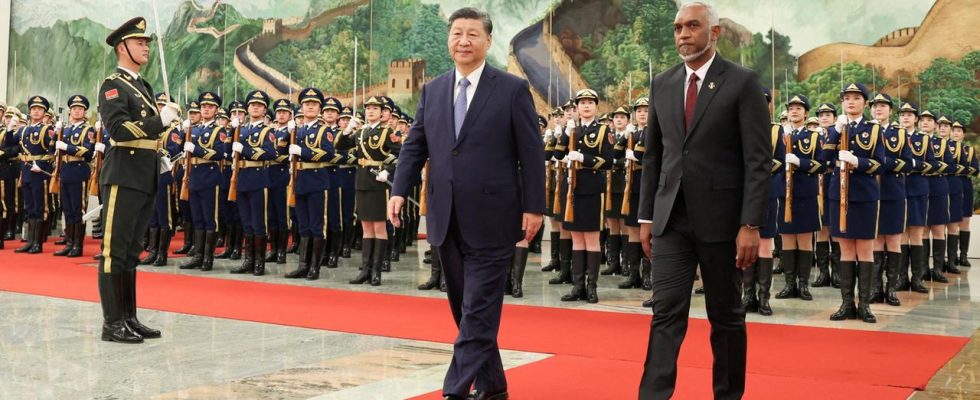analysis
India and China are also fighting for influence in the Indian Ocean. Now the Maldives have broken with India and turned to China instead. India has already announced an answer.
For some people, the thought of the Maldives puts them in a peaceful mood. Many Indians now feel differently. Because the neighboring archipelago has thrown them out quite abruptly – not the tourists, but the Indian soldiers who are stationed there.
The President of the Maldives, Mohammed Muizzu, has decreed their expulsion. But that’s not all: At the same time, a military agreement between the Maldives and India’s rival China became public. And then a Chinese spy ship showed up off the Maldives.
What’s going on? More and more international observers are asking themselves. Possibly a dramatic change in the balance of power in the Indian Ocean and even globally? Another stage on the road to Chinese dominance in Asia and beyond?
“China has put down firm roots”
In fact, Chinese influence in the region has been growing continuously for years, through alliances with Pakistan, Sri Lanka and now increasingly with the Maldives. Alok Bansal, military policy expert from the Indian think tank “SAISA”, explains: “China has put down firm roots in this region and has reached deep into its pockets. It is investing heavily in many countries, including the Maldives. It is no coincidence that the new president of the Maldives first visited China.” And not its neighbor India. An affront.
But why are the Maldives of enormous strategic importance? Less because of the population, more because of its location in the middle of the Indian Ocean.
Only half a million people live there, almost half crowded together in the capital Male. From there there is now a bridge to the airport, which is located on an offshore island. The 1.4 kilometer long prestigious project, which began operations in 2018, cost around 200 million euros. Most of the money came from China.
The infrastructure minister of the Maldives who was jointly responsible for this was called Mohammed Muizzu, and like the entire cabinet at the time, he was committed to a pro-China course. Beijing repeatedly helped the government in Male with loans. The loan debt now amounts to the equivalent of more than one billion euros. That doesn’t sound like much from a German perspective, but it is more than half of the Maldives’ annual government revenue. Such high liabilities make you dependent.
One of the infrastructure projects financed by China: the Sinamale Bridge in the capital Male.
Away from China – and back again
After the cabinet to which Muizzu belonged was voted out in 2018 – not least due to allegations of corruption – the successor government tried to change course away from China and towards its Indian neighbor. The mainland is only 2,000 kilometers away (China is 5,000 kilometers away) and diplomatic contacts are traditionally much more intensive.
India now made a name for itself as a lender – and as an infrastructure promoter. A bridge is currently being built on behalf of India that will connect Male with three neighboring islands, with a total length of almost seven kilometers. The flow of tourists from India also swelled. In the last three years, most foreign visitors to the Maldives have come from India. And now everything back again?
In fact, that’s what it looks like. Mohammed Muizzu ran for president and campaigned on an “India Out” campaign. On the one hand, this was a retaliation for India’s support of the previous government.
On the other hand, India’s Prime Minister Narendra Modi’s Hindu nationalism is not well received by the conservative Muslim voters of the Muizzu Party – the population of the Maldives is officially 100 percent Muslim. Beijing’s actions towards the Muslim Uyghur minority in China are apparently perceived as less disturbing.
A few weeks after taking office, Maldives President Muizzu and his wife traveled to China, where he was received by President Xi and his wife.
Soldiers have to go – tourists stay away
Muizzu won in the fall of 2023 and shortly afterwards got serious, first with the forced departure of the Indian military forces. At first glance, their number is minimal at 80 and the activity is of a rather non-military nature. In the event of a disaster, the soldiers should help with the evacuation.
But the symbolic meaning of the running pass is significant. The first 25 have just left, the rest are due to follow by May 10th. As if in protest, more and more Indian tourists are staying away. Their number has fallen by a third since the beginning of the year. Most visitors now come, no surprise, from China.
India is looking for an alternative
The political response from New Delhi was not long in coming. Prime Minister Modi announced that he would develop the Indian Laccadives archipelago into a holiday hotspot in the Indian Ocean. Their picturesque atolls are only 130 kilometers north of the Maldives. A military base is also to be built here – as a response to the increased Chinese presence.
The new Indian toughness could pay off, says Alok Bansal from the SAISA think tank: “This categorical pro-China policy of the Maldives is a temporary phenomenon. At some point they will recalculate and come to their senses again. Especially in the event of a disaster, India is much closer to the Maldives . They will see that.”
It is not yet clear how the Arab states, Europe and the USA will react to the shift in power. Not to mention the reaction of Western tourists to the tussle for power. Who wants to vacation on atolls that could turn into powder kegs?

